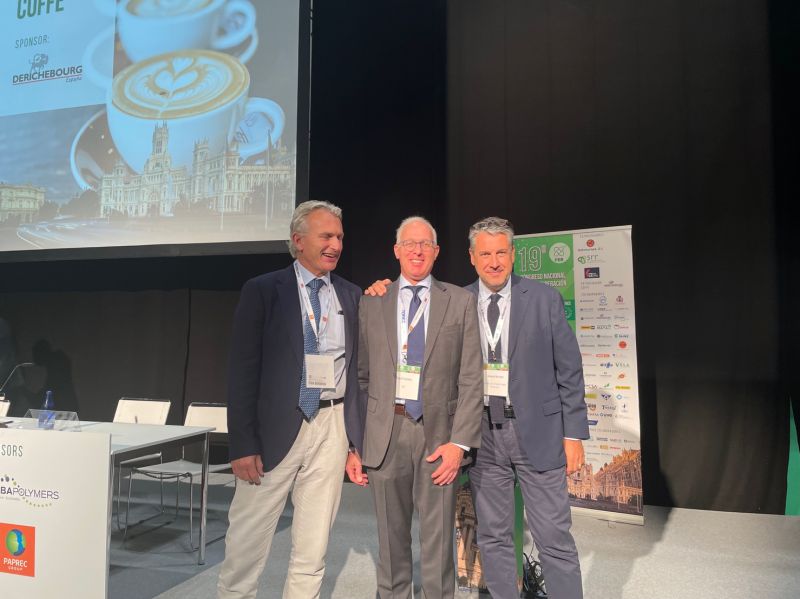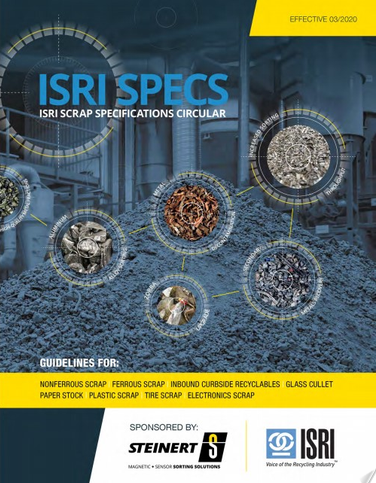Two weeks after attending the Bureau of International Recycling (BIR) conference in Barcelona, Spain, representatives from ISRI flew to Madrid to attend the 2022 European Recycling Conference organized by the European Recycling Industries’ Confederation (EuRIC) in cooperation with the Spanish Recycling Federation (FER). Held June 14-15, the conference brought together company executives, Federation leaders, and officials from EU institutions to discuss the regulatory and business developments in European recycling and beyond.
The conference was held in conjunction with the 7th International Recycling and Recovery Trade Fair organized by the Fair Institution of Madrid (IFEMA MADRID), featuring 200 exhibition stands and attracting more than 10,000 visitors. IFEMA MADRID is a consortium of the Community of Madrid, the Madrid City Council, the Chamber of Commerce and Industry, and the Montemadrid Foundation, which conducts social work in Spanish cities.
Fred Fischer, ISRI’s assistant vice president of international trade, was asked to serve as a speaker on the panel “Uncertain Times for Free and Fair Trade of Raw Materials from Recycling.” The panel included representatives from ISRI, BIR, the Material Recycling Association of India (MRAI), and the Bureau of Middle East Recycling (BMR).
BIR President Tom Bird, began with an impactful statement: “I don’t deal in waste; I deal in recycled raw material.” It’s a sentiment that ISRI strongly supports, says Cheryl Coleman, ISRI’s vice president of sustainability, who attended the session. “The bold and powerful statement really kicked the presentation off in the right direction,” she adds.
Bird touched on the proposed revisions to EU waste shipment regulations. While the revisions are presented as a tool for protecting the environment and public health, the regulations will have the practical effect of limiting exports and keeping material flow within the EU at the expense of trading partners and customer countries. Bird noted the international recycling community is not promoting exports of recyclable materials; rather, exports should not be restricted but left to market forces to determine the flow of exports and imports. “Allowing market forces to determine the flow of trade supports sustainable recycling and the development of a circular economy,” Fischer says. “I thought Mr. Bird made an important point.”
In his presentation, Fischer gave the U.S. perspective on recycling issues. He discussed the importance of international trade in recyclable materials and noted that approximately one-quarter of all recyclable commodities consumed globally are traded internationally, with approximately 927 million tons of recyclable commodities valued at $191 billion exported around the world in 2021. He also highlighted ISRI’s international trade priorities, which include:
- Promoting responsible recycling.
- Supporting free and fair trade.
- Promoting Design for Recycling®.
- Advancing ISRI Specifications and quality standards.
- Strengthening relationships with international recycling associations.
- Increasing coordinated action among the international recycling community.
- Providing thought leadership on emerging industry challenges, including environmental, social, and governance (ESG), and extended producer responsibility (EPR), among others.
Fischer also noted the discussion around recycling has changed, going beyond waste management. Recycling encompasses issues related to supply chains, infrastructure, resource management, and sustainability, among other things. “With more comprehensive messaging, we are able to present our concerns before a broader range of policymakers,” he says.
Coleman thought Fischer gave a great presentation that was of value to the audience. “He was able to articulate how ISRI’s priorities are often very similar to the priorities of EuRIC and BIR,” she says. “Overall, everyone on the panel discussed different points but the theme of highlighting the value of recyclables in the marketplace was consistent.”
Though it only launched a few years ago, Fischer found the European recycling conference well attended with more than 400 people. “EuRIC is growing, and Europe represents an important market for our members, so in the future, ISRI may send more representatives and participate more actively,” Fischer says.
Hugo Morán Fernández, Spain’s Secretary of state for environment, and Mariano González Sáez, Spain’s deputy regional minister for environment and agriculture of the Community of Madrid, keynoted in the morning. Enrique García-John, delivered the afternoon keynote on “Implementing the New Circular Economy Action Plan.” García-John is policy officer with the Office of Waste to Resources in the European Commission’s Directorate-General for Environment.
“I think [ISRI’s] presence underscores the importance of the industry and our concerns,” Coleman says. “We want to make sure our voice is being heard and for folks to realize that we’re a lot more aligned on these issues than they may think. I think a strong presence by BIR, MRAI, and ISRI is important at these conferences. We’re there to represent our members and their interests.”
Photo caption: Left to right Tom Bird, President of BIR; Fred Fischer, Assistant Vice President of International Trade, ISRI; and Arnaud Brunet, Director General of BIT.
Additional Resources












